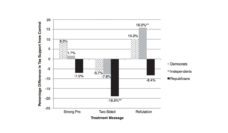Marijuana is one of the most common recreationally used substances in the world, including among pregnant women. Yet, the true health effects of marijuana use in pregnancy and postpartum remain largely unknown. A 2017 report by the National Academy of Medicine concluded that smoking marijuana in pregnancy is linked to lower birthweight. The American College of Obstetricians and Gynecologists recommends that pregnant women not use marijuana for recreational or medical purposes. However, scientists have not found consistent associations between prenatal marijuana use and other outcomes such as preterm birth, neonatal morbidity, or neurological effects from exposure via breastmilk. Recent letters to the editor in leading U.S. obstetrics journals have questioned the assertion that risks of marijuana use by pregnant women merit universal screening. The American Academy of Pediatrics and the Academy of Breastfeeding Medicine have conflicting statements about whether women who use marijuana should be discouraged from breastfeeding.
This scientific uncertainty has created challenges for public health agencies responsible for implementing public education about marijuana use. Public health agencies face the challenge of communicating uncertain risk. Yet, if risks are overstated and don’t take cultural norms into account, such communications will be ineffective. My research has focused on investigating the perception and communication of the risks of marijuana use during pregnancy and postpartum.
We have documented an increasing perception among women that marijuana use is not risky. Analyzing data from the National Survey of Drug Use and Health, we found the perception that regular marijuana use has ‘no risk’ of physical or other harm increased three-fold from 2005 through 2015 among U.S. women of reproductive age.
Although 59% of media portrayed that risks of prenatal marijuana use outweighed benefits, 10% portrayed that benefits outweighed risks, and 30% were neutral.
Because media likely play a role in shaping public perception, we analyzed the content of online media focused on marijuana use in pregnancy and postpartum. We used the Google alerts tool to collect a sample of online media, including content from news sites, blogs, and informational websites. Consistent with medical society statements, 51% of media content mentioned fetal growth or neurobehavioral risks of marijuana use. About a third of media content mentioned health benefits of marijuana use during pregnancy, including treatment of morning sickness. Overall, media portrayal of the risk-benefit ratio of prenatal and postpartum marijuana use was mixed. Although 59% of media portrayed that risks of prenatal marijuana use outweighed benefits, 10% portrayed that benefits outweighed risks, and 30% were neutral.
We also analyzed published information about marijuana use in pregnancy and postpartum among state and federal public health agencies. Among all state agencies and five federal health agencies, we found that 11 contained any published information about marijuana use in pregnancy. (Note: Since publication of this study, the Centers for Disease Control and Prevention and several state agencies have published such content.) Although the content generally conveyed that marijuana use is associated with health risks, less than half of the content included resources to help women stop using marijuana in the perinatal period. A small number of agencies had published information about other potential risks related to safety and parenting, such as accidental consumption of marijuana products by infants or toddlers.
It is not ethical for researchers to assign marijuana use to pregnant women and study what happens. For that reason, public health knowledge must depend on well-conducted studies of people who choose to use marijuana. It will likely take years, and the comparison of results from many different studies, to draw causal conclusions between marijuana use during pregnancy and postpartum and child health. Our research suggests that health communication about marijuana use in pregnancy and postpartum should be improved. Scientific uncertainty about the risks of marijuana use in pregnancy and postpartum is precisely why public health agencies can play such an important role in health communication.
Feature image: ruizluquepaz/iStock













